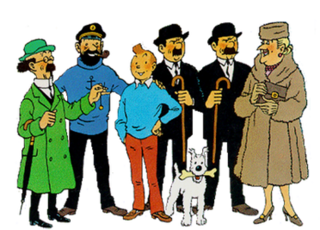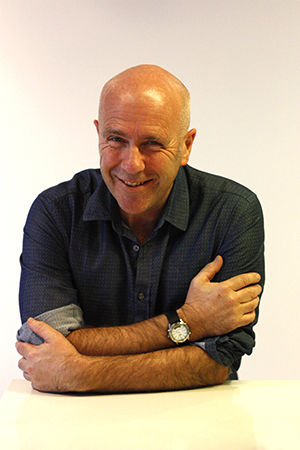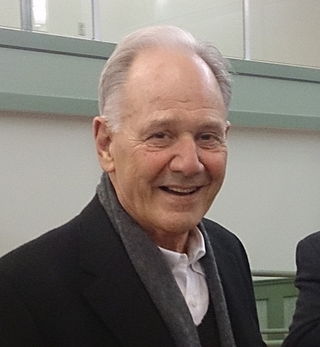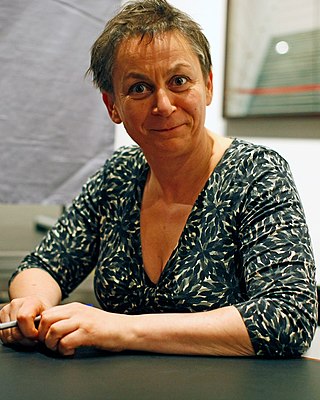
The Adventures of Tintin is a series of 24 comic albums created by Belgian cartoonist Georges Remi, who wrote under the pen name Hergé. The series was one of the most popular European comics of the 20th century. By 2007, a century after Hergé's birth in 1907, Tintin had been published in more than 70 languages with sales of more than 200 million copies, and had been adapted for radio, television, theatre, and film.

Tintin and Alph-Art is the unfinished twenty-fourth and final volume of The Adventures of Tintin, the comics series by Belgian cartoonist Hergé. Left incomplete on Hergé's death, the manuscript was posthumously published in 1986. The story revolves around Brussels' modern art scene, where the young reporter Tintin discovers that a local art dealer has been murdered. Investigating further, he encounters a conspiracy of art forgery, masterminded by a religious teacher named Endaddine Akass.

Dave Eggers is an American writer, editor, and publisher. He is best known for his 2000 memoir, A Heartbreaking Work of Staggering Genius, which became a bestseller and was a finalist for the Pulitzer Prize for General Non-Fiction. Eggers is also the founder of several notable literary and philanthropic ventures, including the literary journal Timothy McSweeney's Quarterly Concern, the literacy project 826 Valencia, and the human rights nonprofit Voice of Witness. Additionally, he founded ScholarMatch, a program that connects donors with students needing funds for college tuition. His writing has appeared in numerous prestigious publications, including The New Yorker, Esquire, and The New York Times Magazine.

Cormac McCarthy was an American writer who wrote twelve novels, two plays, five screenplays, and three short stories, spanning the Western, postapocalyptic, and southern gothic genres. His works often include graphic depictions of violence, and his writing style is characterised by a sparse use of punctuation and attribution. He is widely regarded as one of the greatest American novelists.

Tintin in Tibet is the twentieth volume of The Adventures of Tintin, the comics series by Belgian cartoonist Hergé. It was serialised weekly from September 1958 to November 1959 in Tintin magazine and published as a book in 1960. Hergé considered it his favourite Tintin adventure and an emotional effort, as he created it while suffering from traumatic nightmares and a personal conflict while deciding to leave his wife of three decades for a younger woman. The story tells of the young reporter Tintin in search of his friend Chang Chong-Chen, who the authorities claim has died in a plane crash in the Himalayas. Convinced that Chang has survived and accompanied only by Snowy, Captain Haddock and the Sherpa guide Tharkey, Tintin crosses the Himalayas to the plateau of Tibet, along the way encountering the mysterious Yeti.

Roderick Doyle is an Irish novelist, dramatist and screenwriter. He is the author of eleven novels for adults, eight books for children, seven plays and screenplays, and dozens of short stories. Several of his books have been made into films, beginning with The Commitments in 1991. Doyle's work is set primarily in Ireland, especially working-class Dublin, and is notable for its heavy use of dialogue written in slang and Irish English dialect. Doyle was awarded the Booker Prize in 1993 for his novel Paddy Clarke Ha Ha Ha.

Tintin in the Congo is the second volume of The Adventures of Tintin, the comics series by Belgian comic strip artist Hergé. Commissioned by the conservative Belgian newspaper Le Vingtième Siècle for its children's supplement Le Petit Vingtième, it was serialised weekly from May 1930 to June 1931 before being published in a collected volume by Éditions de Petit Vingtième in 1931. The story tells of young Belgian reporter Tintin and his dog Snowy, who are sent to the Belgian Congo to report on events in the country. Amid various encounters with the native Congolese people and wild animals, Tintin unearths a criminal diamond smuggling operation run by the American gangster Al Capone.

William John Banville is an Irish novelist, short story writer, adapter of dramas and screenwriter. Though he has been described as "the heir to Proust, via Nabokov", Banville himself maintains that W. B. Yeats and Henry James are the two real influences on his work.

Richard Miller Flanagan is an Australian writer, who has also worked as a film director and screenwriter. He won the 2014 Man Booker Prize for his novel The Narrow Road to the Deep North.

Simon Critchley is an English philosopher and the Hans Jonas Professor of Philosophy at the New School for Social Research in New York, USA.

Alexander McPhee Miller is an Australian novelist. Miller is twice winner of the Miles Franklin Award, in 1993 for The Ancestor Game and in 2003 for Journey to the Stone Country. He won the overall award for the Commonwealth Writer's Prize for The Ancestor Game in 1993. He is twice winner of the New South Wales Premier's Literary Awards Christina Stead Prize for Conditions of Faith in 2001 and for Lovesong in 2011. In recognition of his impressive body of work and in particular for his novel Autumn Laing he was awarded the Melbourne Prize for Literature in 2012.
Frederic Tuten is an American novelist, short story writer and essayist. He has written five novels – The Adventures of Mao on the Long March (1971), Tallien: A Brief Romance (1988), Tintin in the New World: A Romance (1993), Van Gogh's Bad Café (1997) and The Green Hour (2002) – as well as one book of inter-related short stories, Self-Portraits: Fictions (2010), and essays, many of the latter being about contemporary art. His memoir My Young Life (2019) was published by Simon & Schuster. In 2022, he published a collection of short stories, The Bar at Twilight, and On a Terrace in Tangier, a book of Tuten's drawings, each drawing accompanied by a short story. Tuten received a Guggenheim Fellowship for Fiction and was given the Award for Distinguished Writing from the American Academy of Arts and Letters. He was awarded four Pushcart Prizes and one O. Henry Prize.
Lee Scrivner is an American writer and cultural theorist known for his book Becoming Insomniac (2014) and for his satirical avant-garde art manifestos. He writes on the literature, history, and culture of the Victorian and Modernist periods, as well as on contemporary issues.

The Road is a 2006 post-apocalyptic novel by American writer Cormac McCarthy. The book details the grueling journey of a father and his young son over several months across a landscape blasted by an unspecified cataclysm that has destroyed industrial civilization and nearly all life. The novel was awarded the 2007 Pulitzer Prize for Fiction and the James Tait Black Memorial Prize for Fiction in 2006. The book was adapted into a film of the same name in 2009, directed by John Hillcoat.
The 21st century in literature refers to world literature produced during the 21st century. The measure of years is, for the purpose of this article, literature written from (roughly) the year 2001 to the present.

Anne Teresa Enright is an Irish writer. The first Laureate for Irish Fiction (2015–2018) and winner of the Man Booker Prize (2007), she has published eight novels, many short stories, and a non-fiction work called Making Babies: Stumbling into Motherhood, about the birth of her two children. Her essays on literary themes have appeared in the London Review of Books and The New York Review of Books, and she writes for the books pages of The Irish Times and The Guardian. Her fiction explores themes such as family, love, identity and motherhood.
Omer Fast is an Israeli contemporary artist.

Get It Louder is a Chinese contemporary art festival that began in 2005 and features exhibitions focusing primarily on young Chinese talent within the spheres of art, architecture, design, literature, film and music. Ou Ning helped launch the project with the help of the agency Modern Media and has served as the biennial's main curator for every year to date except 2012. In an interview, Ou said Get It Louder's inception was meant to showcase young Chinese design talent through a series of traveling exhibitions in Beijing, Shanghai and Guangzhou. "Young" in this case is more connected to being "fresh" and "edgy" than a particular age, one of the reasons the older, established artist Ai Weiwei was included in past exhibitions. International, non-Chinese artists and designers have also played a significant part in Get It Louder's exhibitions.

Remainder is a 2005 novel by British author Tom McCarthy. It is McCarthy's third published work. It was first written in 2001, although not published until 2005. The novel was later re-printed by UK publishing house Alma Books; Vintage Books printed the book in the United States. The plot revolves around an unnamed narrator who has received a large financial settlement after an accident, and his obsession with recreating half-remembered events from his life before the incident.















